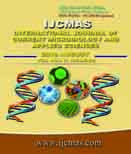


 National Academy of Agricultural Sciences (NAAS)
National Academy of Agricultural Sciences (NAAS)

|
PRINT ISSN : 2319-7692
Online ISSN : 2319-7706 Issues : 12 per year Publisher : Excellent Publishers Email : editorijcmas@gmail.com / submit@ijcmas.com Editor-in-chief: Dr.M.Prakash Index Copernicus ICV 2018: 95.39 NAAS RATING 2020: 5.38 |
Molecular epidemiology is a science that focuses on the contribution of potential genetic and environmental risk factors, identified at the molecular level, to the etiology, distribution and prevention of disease Molecular epidemiology provides the ‘tools’ (both laboratory and analytical) that have predictive significance and that epidemiologists can use to better define the etiology of specific diseases, and work towards their control. Application of these molecular techniques has increased the understanding of the epidemiology of the most important infectious agents, Phytophthora infestans. Recent progress in P. infestans genomics is providing the raw data for such methods and new bio molecular markers are currently being developed which have tremendous potential in the study of P. infestans. Closer collaborations between specialists in the fields of plant pathology, epidemiology, population genetics / molecular ecology, P. infestans molecular biology and plant breeding are advocated to enable such progress. Molecular techniques help to stratify and to refine data by providing more sensitive and specific measurements which facilitate epidemiologic activities including disease surveillance, outbreak investigations, identifying transmission patterns and risk factors among apparently disparate cases characterizing host pathogen interactions and providing better understanding of disease pathogenesis at the molecular level..
 |
 |
 |
 |
 |